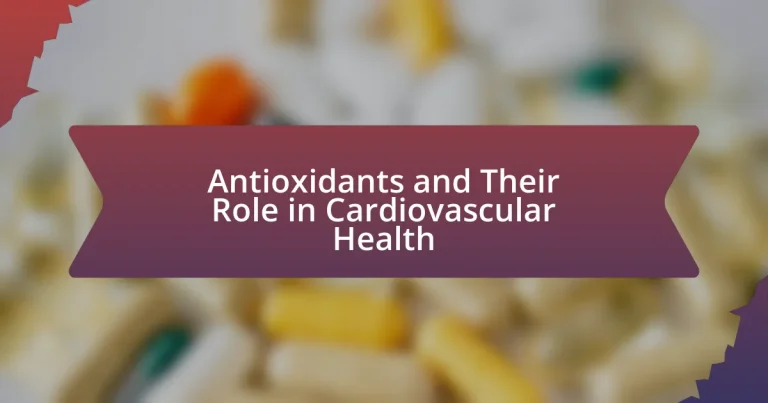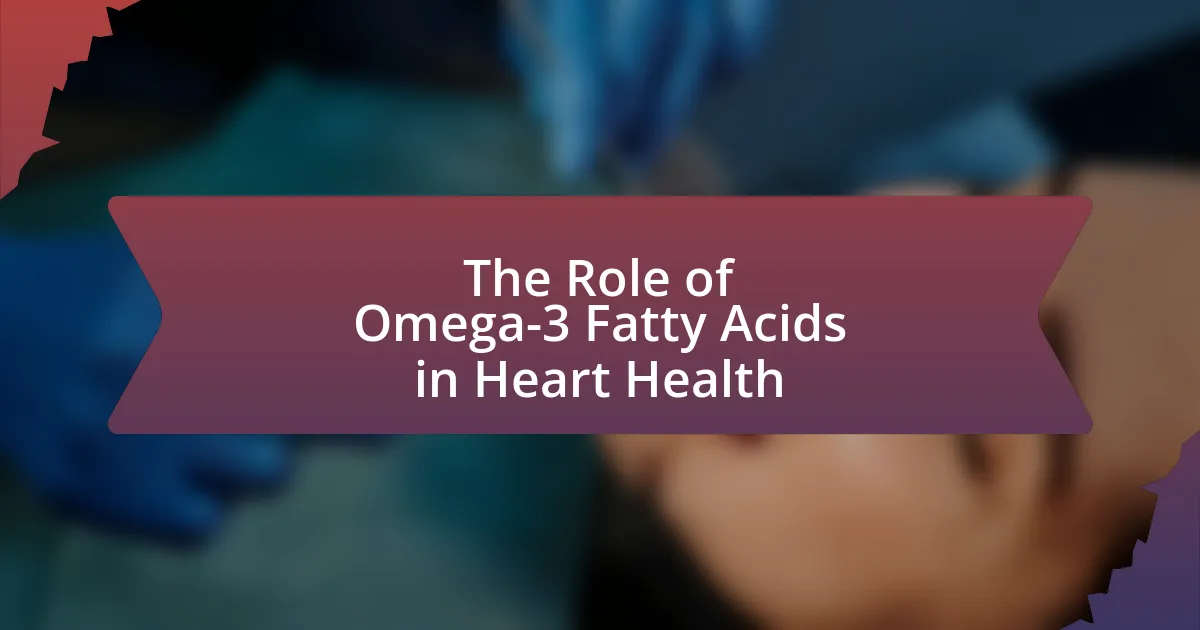Antioxidants are molecules that play a crucial role in protecting the body from oxidative stress and reducing the risk of cardiovascular diseases. This article explores the importance of antioxidants, including their mechanisms of action, types, and sources, as well as their impact on inflammation, cholesterol levels, and overall heart health. It highlights research findings that demonstrate the benefits of a diet rich in antioxidants, such as vitamins C and E, flavonoids, and polyphenols, in preventing heart disease and improving cardiovascular function. Additionally, practical tips for enhancing antioxidant intake through dietary choices and cooking methods are provided to support cardiovascular health.
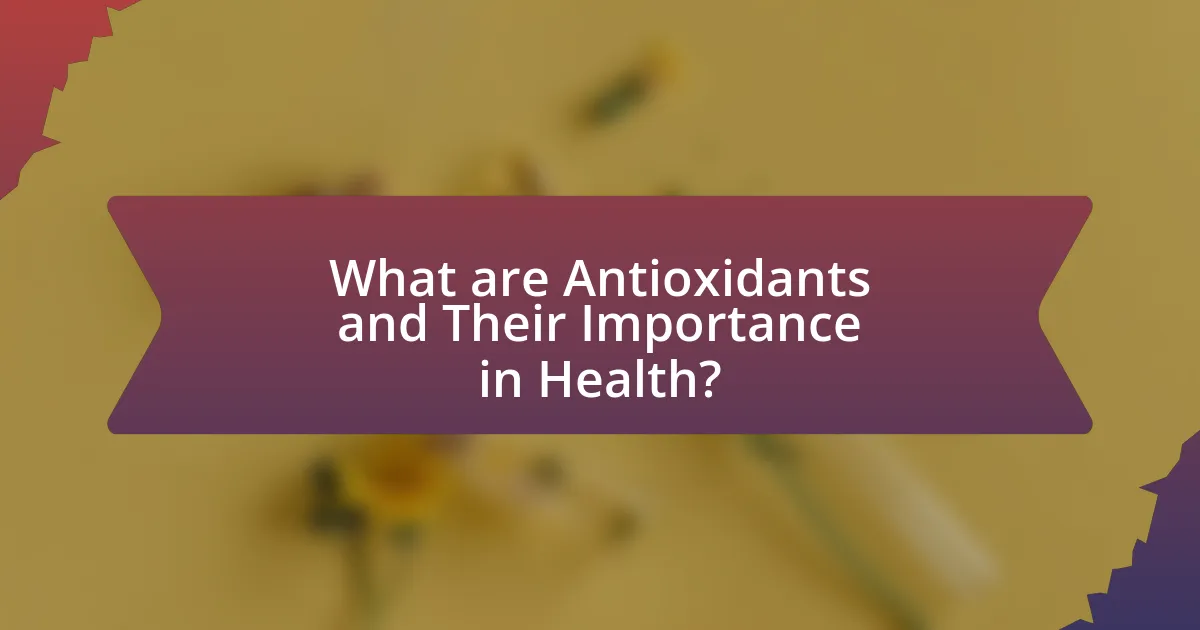
What are Antioxidants and Their Importance in Health?
Antioxidants are molecules that inhibit oxidation and neutralize free radicals in the body, thereby protecting cells from damage. Their importance in health lies in their ability to reduce oxidative stress, which is linked to various chronic diseases, including cardiovascular diseases. Research indicates that diets rich in antioxidants, such as vitamins C and E, flavonoids, and carotenoids, can lower the risk of heart disease by improving endothelial function and reducing inflammation. For instance, a study published in the Journal of the American College of Cardiology found that higher intake of antioxidant-rich foods is associated with a lower incidence of cardiovascular events.
How do antioxidants function in the body?
Antioxidants function in the body by neutralizing free radicals, which are unstable molecules that can cause oxidative stress and damage to cells. This protective mechanism helps to maintain cellular integrity and prevent chronic diseases, including cardiovascular conditions. Research indicates that antioxidants, such as vitamins C and E, and compounds like flavonoids, can reduce inflammation and improve endothelial function, thereby supporting heart health. For instance, a study published in the Journal of the American College of Cardiology found that higher dietary intake of antioxidants is associated with a lower risk of heart disease, highlighting their crucial role in cardiovascular health.
What are the different types of antioxidants?
There are several types of antioxidants, including enzymatic antioxidants, non-enzymatic antioxidants, and dietary antioxidants. Enzymatic antioxidants, such as superoxide dismutase, catalase, and glutathione peroxidase, are produced by the body and help neutralize free radicals. Non-enzymatic antioxidants include vitamins C and E, which can be obtained from various foods and help protect cells from oxidative damage. Dietary antioxidants, found in fruits, vegetables, and whole grains, include flavonoids, carotenoids, and polyphenols, which contribute to cardiovascular health by reducing inflammation and improving endothelial function.
How do antioxidants neutralize free radicals?
Antioxidants neutralize free radicals by donating electrons to them, which stabilizes the free radicals and prevents them from causing cellular damage. Free radicals are unstable molecules that can lead to oxidative stress, contributing to various diseases, including cardiovascular conditions. Antioxidants, such as vitamins C and E, and compounds like flavonoids, effectively counteract this process by breaking the chain reaction of free radical formation, thereby protecting cells and tissues from oxidative damage. This mechanism is supported by numerous studies demonstrating that higher antioxidant intake is associated with a reduced risk of cardiovascular diseases.
Why are antioxidants crucial for cardiovascular health?
Antioxidants are crucial for cardiovascular health because they protect the body from oxidative stress, which can lead to inflammation and damage to blood vessels. Oxidative stress occurs when there is an imbalance between free radicals and antioxidants in the body, contributing to the development of atherosclerosis and other cardiovascular diseases. Studies have shown that diets rich in antioxidants, such as vitamins C and E, can reduce the risk of heart disease by improving endothelial function and lowering blood pressure. For instance, a meta-analysis published in the Journal of the American College of Cardiology found that higher antioxidant intake is associated with a significant reduction in cardiovascular events.
What role do antioxidants play in preventing heart disease?
Antioxidants play a crucial role in preventing heart disease by neutralizing free radicals, which can cause oxidative stress and damage to blood vessels. This oxidative damage is linked to the development of atherosclerosis, a condition characterized by the buildup of plaque in the arteries, leading to heart attacks and strokes. Studies have shown that diets rich in antioxidants, such as vitamins C and E, and compounds found in fruits and vegetables, can reduce the risk of heart disease by improving endothelial function and reducing inflammation. For instance, a meta-analysis published in the Journal of the American College of Cardiology found that higher intake of antioxidant-rich foods is associated with a lower risk of cardiovascular events.
How do antioxidants impact inflammation related to cardiovascular issues?
Antioxidants reduce inflammation related to cardiovascular issues by neutralizing free radicals, which are reactive molecules that can cause oxidative stress and tissue damage. This oxidative stress is a key contributor to chronic inflammation, which is linked to the development of cardiovascular diseases such as atherosclerosis. Studies have shown that antioxidants, such as vitamins C and E, can lower markers of inflammation, including C-reactive protein (CRP) and interleukin-6 (IL-6), thereby improving cardiovascular health. For instance, a meta-analysis published in the Journal of the American College of Cardiology found that higher antioxidant intake is associated with a reduced risk of cardiovascular events, highlighting their protective role against inflammation.
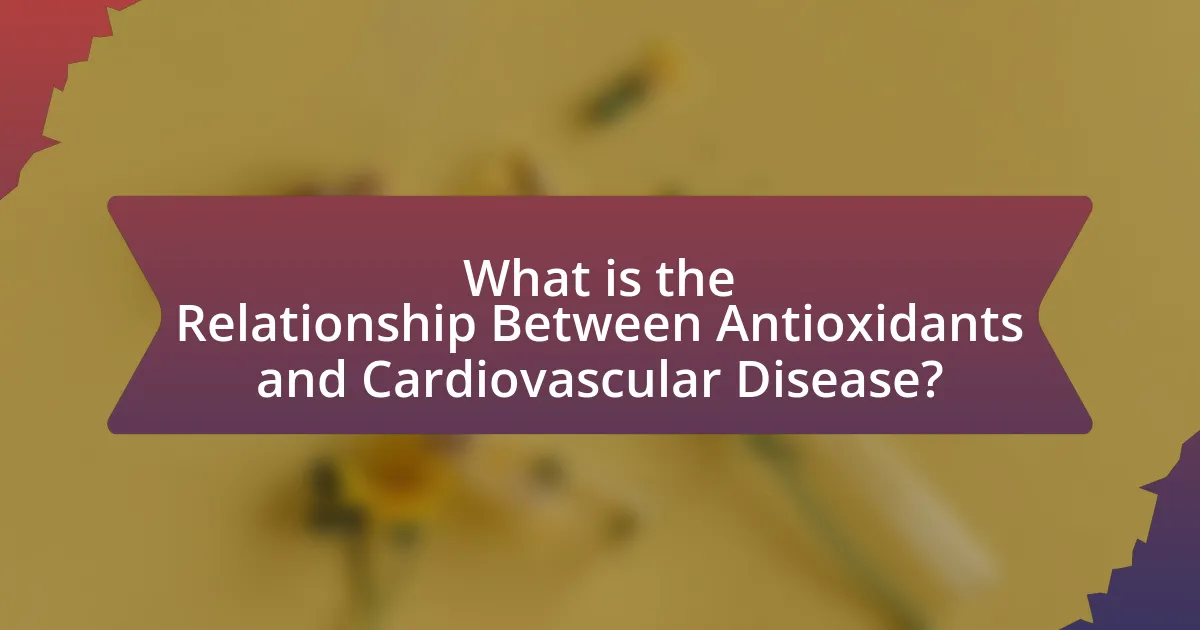
What is the Relationship Between Antioxidants and Cardiovascular Disease?
Antioxidants play a significant role in reducing the risk of cardiovascular disease by neutralizing free radicals that can cause oxidative stress, a key factor in the development of heart-related conditions. Research indicates that diets rich in antioxidants, such as vitamins C and E, flavonoids, and polyphenols, are associated with lower rates of cardiovascular events. For instance, a study published in the Journal of the American College of Cardiology found that higher intake of antioxidant-rich foods correlates with a reduced risk of coronary heart disease. This evidence supports the notion that antioxidants contribute to cardiovascular health by mitigating oxidative damage and inflammation, which are critical in the pathogenesis of cardiovascular disease.
How do antioxidants affect cholesterol levels?
Antioxidants can positively affect cholesterol levels by reducing oxidative stress and inflammation, which are linked to the oxidation of low-density lipoprotein (LDL) cholesterol. When LDL cholesterol is oxidized, it can lead to plaque formation in arteries, increasing the risk of cardiovascular diseases. Studies have shown that antioxidants, such as vitamin E and vitamin C, can help prevent this oxidation process, thereby maintaining healthier cholesterol levels. For instance, a study published in the “American Journal of Clinical Nutrition” found that higher intake of antioxidants was associated with lower levels of oxidized LDL cholesterol, suggesting a protective effect against cardiovascular risk factors.
What is the connection between antioxidants and LDL oxidation?
Antioxidants play a crucial role in preventing LDL oxidation, which is a key factor in the development of atherosclerosis. LDL, or low-density lipoprotein, can undergo oxidation due to oxidative stress, leading to the formation of oxidized LDL that contributes to plaque buildup in arteries. Antioxidants neutralize free radicals and reactive oxygen species, thereby reducing oxidative stress and protecting LDL from oxidation. Studies have shown that higher levels of antioxidants in the diet are associated with lower levels of oxidized LDL, indicating a protective effect against cardiovascular diseases.
How do antioxidants influence HDL functionality?
Antioxidants enhance HDL functionality by reducing oxidative stress, which can impair HDL’s ability to transport cholesterol and protect against cardiovascular disease. Studies indicate that antioxidants, such as vitamin E and polyphenols, improve HDL’s anti-inflammatory and cholesterol efflux properties, thereby promoting cardiovascular health. For instance, research published in the Journal of Lipid Research demonstrates that antioxidant-rich diets correlate with increased HDL functionality and reduced atherosclerosis risk, highlighting the critical role of antioxidants in maintaining HDL’s protective effects.
What evidence supports the role of antioxidants in cardiovascular health?
Antioxidants play a significant role in cardiovascular health by reducing oxidative stress, which is linked to heart disease. Numerous studies have demonstrated that antioxidants, such as vitamins C and E, can lower blood pressure and improve endothelial function. For instance, a meta-analysis published in the American Journal of Clinical Nutrition found that supplementation with vitamin C significantly reduced systolic and diastolic blood pressure in hypertensive individuals. Additionally, research published in the Journal of the American College of Cardiology indicated that higher dietary intake of antioxidants from fruits and vegetables correlates with a lower risk of cardiovascular events. These findings collectively support the beneficial effects of antioxidants on cardiovascular health.
What studies highlight the benefits of antioxidants for heart health?
Several studies highlight the benefits of antioxidants for heart health, including a meta-analysis published in the Journal of the American College of Cardiology, which found that higher dietary intake of antioxidants, particularly flavonoids, is associated with a reduced risk of cardiovascular disease. Another significant study, the Nurses’ Health Study, indicated that women who consumed higher levels of vitamin E had a lower incidence of coronary heart disease. Additionally, research published in the American Journal of Clinical Nutrition demonstrated that antioxidant supplementation can improve endothelial function, which is crucial for cardiovascular health. These studies collectively support the role of antioxidants in promoting heart health by reducing oxidative stress and improving vascular function.
How do dietary antioxidants compare to supplements in cardiovascular protection?
Dietary antioxidants provide more effective cardiovascular protection compared to supplements. Research indicates that antioxidants from whole foods, such as fruits and vegetables, are better absorbed and utilized by the body, leading to enhanced cardiovascular benefits. For instance, a study published in the Journal of the American College of Cardiology found that individuals consuming a diet rich in antioxidants had a significantly lower risk of heart disease compared to those relying on antioxidant supplements. This is attributed to the synergistic effects of various nutrients found in whole foods, which work together to improve heart health, unlike isolated supplements that may not offer the same protective effects.
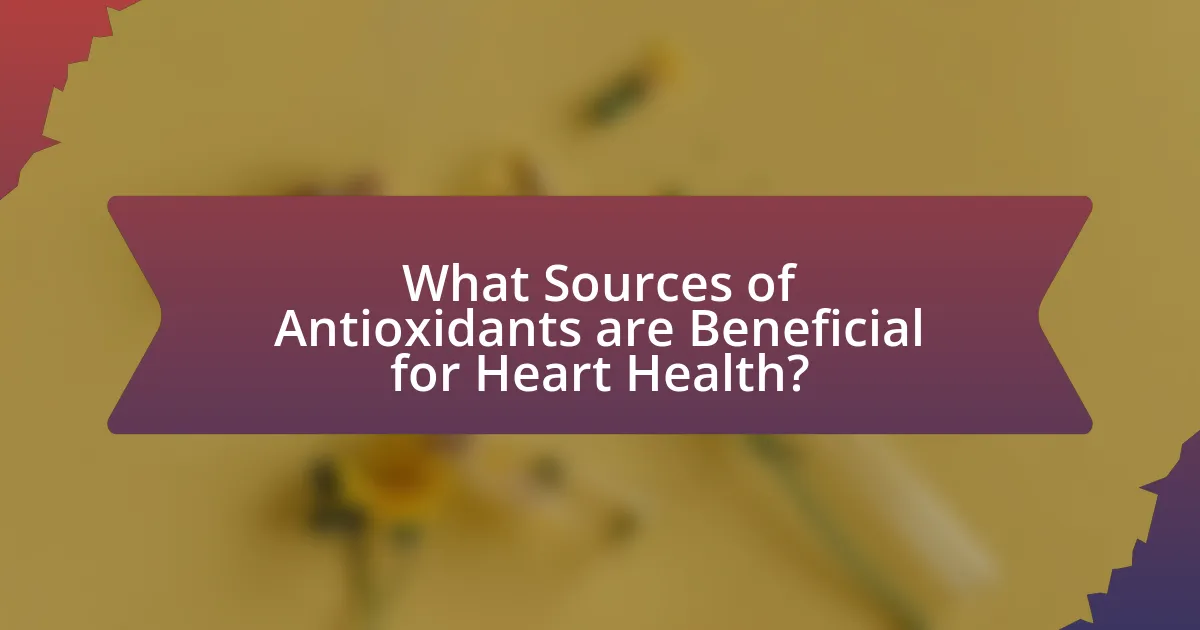
What Sources of Antioxidants are Beneficial for Heart Health?
Sources of antioxidants that are beneficial for heart health include fruits, vegetables, nuts, and whole grains. Specifically, berries such as blueberries and strawberries are rich in flavonoids, which have been shown to improve heart health by reducing blood pressure and inflammation. Leafy greens like spinach and kale contain vitamins C and E, both of which are powerful antioxidants that help protect the heart. Additionally, nuts such as walnuts and almonds provide healthy fats and antioxidants that can lower cholesterol levels. Whole grains, particularly oats and brown rice, are also beneficial due to their high fiber content and antioxidant properties. Studies indicate that a diet rich in these antioxidant sources can significantly reduce the risk of cardiovascular diseases.
Which foods are rich in antioxidants?
Foods that are rich in antioxidants include berries, dark chocolate, nuts, green tea, and leafy greens. Berries such as blueberries, strawberries, and raspberries contain high levels of anthocyanins, which are powerful antioxidants. Dark chocolate, particularly varieties with at least 70% cocoa, is rich in flavonoids that provide antioxidant benefits. Nuts, especially walnuts and pecans, are also high in antioxidants, including vitamin E. Green tea contains catechins, a type of antioxidant that has been linked to various health benefits. Leafy greens like spinach and kale are packed with vitamins A, C, and E, all of which contribute to their antioxidant properties. These foods help combat oxidative stress, which is linked to cardiovascular diseases.
What fruits and vegetables are particularly high in antioxidants?
Berries, particularly blueberries, strawberries, and blackberries, are particularly high in antioxidants. These fruits contain high levels of anthocyanins, which are compounds known for their antioxidant properties. Additionally, vegetables such as kale, spinach, and artichokes are also rich in antioxidants, specifically vitamins C and E, as well as various phytochemicals. Studies have shown that diets rich in these fruits and vegetables can significantly reduce oxidative stress and inflammation, contributing to improved cardiovascular health. For instance, a study published in the Journal of Nutrition found that increased berry consumption was associated with a lower risk of heart disease due to their high antioxidant content.
How do nuts and seeds contribute to antioxidant intake?
Nuts and seeds significantly contribute to antioxidant intake by providing a variety of bioactive compounds, including vitamin E, phenolic acids, and flavonoids. These compounds help neutralize free radicals, thereby reducing oxidative stress, which is linked to cardiovascular diseases. For instance, almonds are rich in vitamin E, which has been shown to protect cell membranes from oxidative damage, while walnuts contain polyphenolic compounds that exhibit strong antioxidant activity. Studies indicate that regular consumption of nuts and seeds can enhance overall antioxidant capacity in the body, supporting cardiovascular health by mitigating inflammation and improving endothelial function.
What lifestyle changes can enhance antioxidant intake?
Incorporating a diet rich in fruits and vegetables significantly enhances antioxidant intake. Consuming a variety of colorful produce, such as berries, leafy greens, and citrus fruits, provides essential vitamins and phytochemicals known for their antioxidant properties. Research indicates that diets high in antioxidants can reduce oxidative stress, which is linked to cardiovascular diseases. For instance, a study published in the “American Journal of Clinical Nutrition” found that individuals who consumed higher amounts of fruits and vegetables had a lower risk of heart disease due to the protective effects of antioxidants like vitamin C and flavonoids. Additionally, reducing processed foods and sugars can further support antioxidant levels, as these foods often lack beneficial nutrients.
How can cooking methods affect antioxidant levels in food?
Cooking methods can significantly affect antioxidant levels in food by altering their bioavailability and stability. For instance, methods such as steaming and microwaving tend to preserve more antioxidants compared to boiling or frying, which can lead to nutrient loss. Research indicates that boiling vegetables can reduce antioxidant levels by up to 50% due to leaching into the cooking water, while steaming retains more of these beneficial compounds. Additionally, high-temperature cooking methods, like frying, can degrade antioxidants through oxidation. Therefore, the choice of cooking method directly influences the antioxidant content of food, impacting its potential health benefits, particularly in relation to cardiovascular health.
What are some practical tips for incorporating more antioxidants into the diet?
To incorporate more antioxidants into the diet, individuals should focus on consuming a variety of colorful fruits and vegetables, as these are rich sources of antioxidants. For example, berries such as blueberries and strawberries contain high levels of anthocyanins, while leafy greens like spinach and kale are packed with vitamins A, C, and E, all of which contribute to antioxidant activity. Additionally, incorporating nuts, particularly walnuts and pecans, can provide healthy fats along with antioxidants like vitamin E.
Research indicates that diets high in fruits and vegetables can reduce the risk of cardiovascular diseases, as antioxidants help combat oxidative stress and inflammation in the body. A study published in the Journal of Nutrition found that higher fruit and vegetable intake is associated with lower blood pressure and improved heart health. Therefore, regularly including a diverse range of these foods in meals can significantly enhance antioxidant intake and support cardiovascular health.
What are the best practices for maintaining cardiovascular health through antioxidants?
The best practices for maintaining cardiovascular health through antioxidants include consuming a diet rich in fruits, vegetables, nuts, and whole grains, which are high in antioxidants like vitamins C and E, flavonoids, and polyphenols. Research indicates that diets abundant in these foods can reduce oxidative stress and inflammation, both of which are linked to cardiovascular diseases. For instance, a study published in the American Journal of Clinical Nutrition found that higher intake of antioxidant-rich foods is associated with a lower risk of heart disease. Regular physical activity also enhances the body’s antioxidant defenses, further supporting cardiovascular health.
